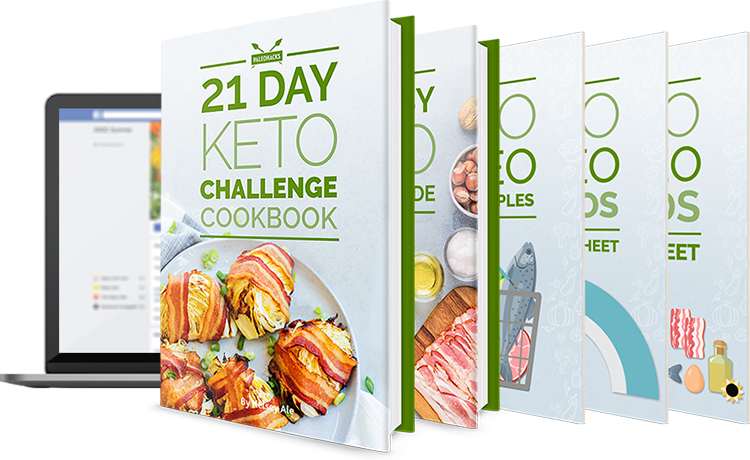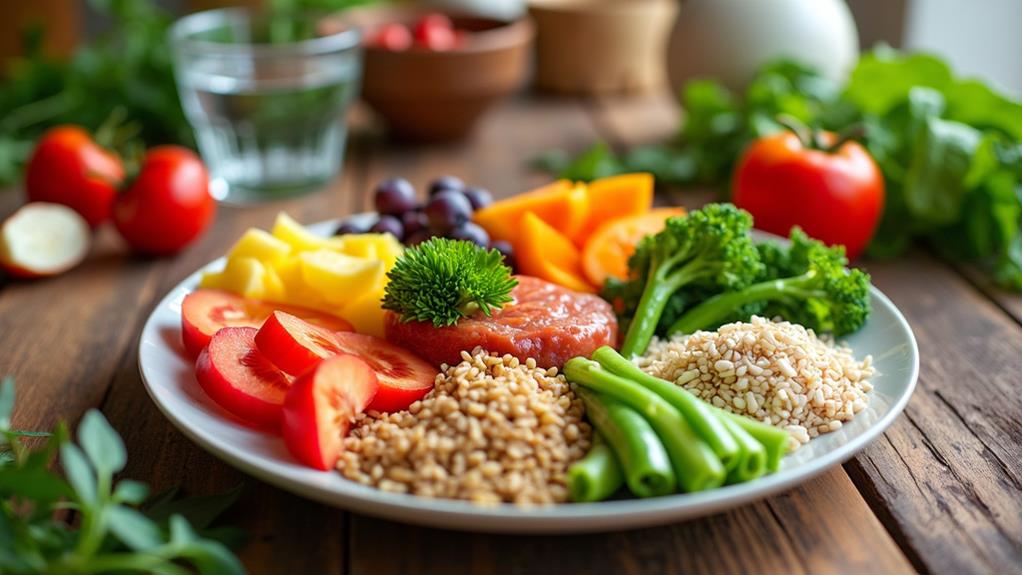When you start meal planning, you'll want to focus on understanding macronutrients, setting realistic goals, and mastering portion control. Begin by evaluating your daily routine and dietary needs to create a plan that fits your lifestyle. Measuring ingredients and pre-portioning snacks can make a significant difference in maintaining balance. Don't forget to take inventory of your pantry and create a grocery list that aligns with your meal plan. But there's more to meal planning than just these basics, like staying hydrated and tracking your progress effectively. Want to know the next steps? Let's explore further.
Understanding Macronutrients
Understanding macronutrients is pivotal for effective meal planning. Without a grasp on macronutrient ratios, you can't balance your diet properly. Macronutrients, including proteins, fats, and carbohydrates, each play a paramount role in your body. To optimize health and performance, you need to allocate the right proportions of these nutrients.
When it comes to protein timing, it is imperative to distribute your intake throughout the day. Consuming protein at regular intervals helps in muscle repair and growth. Aim to include a source of protein in every meal and snack to keep your energy levels stable and support muscle maintenance.
Carbohydrates are your body's primary energy source. Balancing them with proteins and fats guarantees you don't experience energy spikes and crashes. Healthy fats, on the other hand, are indispensable for brain health and hormone production. Seek to include a mix of these macronutrients in each meal.
Understanding macronutrient ratios allows you to tailor your diet to meet your specific needs. Whether you're aiming for weight loss, muscle gain, or overall health, the right balance of proteins, fats, and carbohydrates is key. By focusing on these elements, you'll make informed choices for your meals.
Setting Realistic Goals
Setting realistic goals is crucial for successful meal planning. To create a plan that works for you, consider your daily routines and personal schedules. You're more likely to stick to a meal plan that fits seamlessly into your life. Start by evaluating your current habits and identifying areas where you can make small, manageable changes.
- Evaluate your current daily routines: Understand how your day typically unfolds. Are mornings rushed? Do you have time to cook in the evenings?
- Set specific, achievable goals: Rather than aiming to overhaul your entire diet overnight, focus on one or two changes you can sustain. For example, aim to prepare lunch at home three times a week instead of eating out.
- Account for your personal schedule: If you're busy during the week, plan simpler meals or batch-cook on weekends. Make sure your goals align with your available time and energy levels.
Portion Control Strategies
Once you've set realistic goals for your meal planning, it's important to think about portion control strategies. Controlling portions helps you manage your calorie intake and maintain a balanced diet. Start by using food scales to weigh your ingredients. This confirms you're not accidentally consuming more than you intend. Food scales are particularly useful for measuring items like meats, nuts, and cheese, which can be tricky to estimate by eye.
Next, incorporate measuring cups into your routine. They're perfect for portioning out grains, vegetables, and fluids. For example, when making a bowl of oatmeal, use a measuring cup to guarantee you're not over-serving. A common mistake is underestimating liquid calories, so use a measuring cup for drinks like milk or juice as well.
Pre-portion snacks into smaller containers instead of eating straight from the package. This way, you're not tempted to eat more than a single serving. Another smart strategy is to use smaller plates and bowls. It tricks your brain into feeling satisfied with less food.
Essential Food Groups
When it comes to meal planning, incorporating essential food groups guarantees a balanced and nutritious diet. You need to focus on diverse food categories to verify you're not missing any necessary nutrients. By carefully considering food pairing and nutrient timing, you can optimize your meals for better health and energy.
To cover all bases, include:
- Proteins: These are pivotal for building and repairing tissues. Lean meats, beans, and tofu are excellent sources.
- Carbohydrates: They provide the energy you need for daily activities. Opt for whole grains, fruits, and vegetables.
- Fats: Healthy fats, such as those found in avocados, nuts, and olive oil, are indispensable for brain function and hormone production.
Creating a Grocery List
Crafting an effective grocery list is a cornerstone of successful meal planning. To start, take inventory of your pantry staples like rice, pasta, and canned goods. Knowing what you already have helps avoid unnecessary purchases. Next, plan meals for the week, considering ingredients you need for each recipe. Write down all required items, separating them into categories like produce, dairy, and meat for easy navigation in the store.
Don't forget to check store sales before finalizing your list. Many stores offer weekly deals that can help you save money on frequently used items or even inspire new meal ideas. Incorporate these deals into your plan, adjusting your list accordingly. For example, if chicken breasts are on sale, consider swapping a planned beef dish for a chicken recipe.
Stick to your list to avoid impulse buys, which can derail your budget and meal plan. However, stay flexible for unexpected sales on pantry staples that you can stock up on. With a well-thought-out grocery list, you'll streamline your shopping experience, save money, and guarantee you have everything needed for nutritious, delicious meals throughout the week.
Meal Prep Techniques
To maximize efficiency in the kitchen, mastering meal prep techniques is essential. By getting organized and planning ahead, you can save time, reduce stress, and guarantee you always have healthy meals ready to go.
First, invest in quality meal prep containers. Choose containers that are durable, microwave-safe, and come in various sizes. These will help keep your meals fresh and organized, making it easy to grab and go.
Next, create a cooking schedule. Dedicate a specific day of the week for meal prepping. Many people find that Sundays work well. On your chosen day, prepare multiple meals at once. This approach allows you to cook efficiently and reduces the time spent in the kitchen throughout the week.
Additionally, break down the meal prep process into manageable tasks. Instead of trying to do everything at once, focus on:
- Chopping all vegetables first
- Cooking proteins in bulk
- Portioning out meals into containers
Healthy Snack Options
After you've mastered meal prep techniques, it's important to also consider what you'll snack on throughout the day. Healthy snacks can keep your energy levels stable and prevent overeating at mealtimes. One of the easiest and most nutritious options is fresh fruits. They're naturally sweet, full of vitamins, and require no prep. Keep apples, bananas, or berries on hand for a quick and satisfying snack.
Crunchy veggies are another fantastic choice. Carrots, celery, and bell peppers provide that satisfying crunch and are packed with fiber and nutrients. Pair them with a bit of hummus or a light dip for extra flavor without adding too many calories.
Don't forget nuts and seeds. A small handful of almonds, walnuts, or sunflower seeds can be incredibly filling and offer healthy fats and protein. Just be mindful of portion sizes, as they can be calorie-dense.
Lastly, consider low-fat dairy products like Greek yogurt or cottage cheese. They're rich in protein and can be paired with fresh fruits for a delicious and balanced snack.
Hydration Tips
Staying hydrated is essential for maintaining your overall health and well-being. Proper water intake supports digestion, regulates body temperature, and keeps your skin healthy. It's easy to overlook hydration when meal planning, but it's vital for your body's peak performance.
- Drink water consistently throughout the day: Aim for at least eight 8-ounce glasses of water daily. Carry a reusable water bottle to remind yourself to drink regularly.
- Incorporate water-rich foods: Fruits and vegetables like cucumbers, watermelon, and oranges can substantially boost your water intake while providing essential nutrients.
- Balance your electrolytes: When you sweat, you lose electrolytes. Replenish them with foods like bananas, spinach, and dairy products, or consider an electrolyte-enhanced drink if you're engaging in intense physical activity.
These steps guarantee that your hydration routine complements your meal planning efforts. Remember, staying hydrated isn't just about drinking water — it's also about maintaining electrolyte balance. By integrating these tips into your daily routine, you'll support your body's needs and enhance your overall health.
Tracking Progress
Maintaining hydration is a key part of your meal planning, but equally important is tracking your progress. By monitoring what you eat and drink, you'll gain insights into your daily habits and make adjustments as needed. One effective way to do this is by using habit trackers. These tools can help you keep an eye on your meals, water intake, and even your mood or energy levels.
Start by setting clear goals, whether it's eating more vegetables, reducing sugar, or simply sticking to your meal plan. Write these down in your habit tracker. Each day, mark off your accomplishments. This not only keeps you accountable but also provides a sense of achievement.
Digital apps, journals, or even simple spreadsheets can serve as habit trackers. Choose what works best for you. Remember, consistency is key. Review your tracker regularly to spot patterns and identify areas for improvement. Maybe you'll notice you skip breakfast often or don't drink enough water on weekends.
At a Glance
By understanding macronutrients, setting realistic goals, and controlling portions, you'll master meal planning. Incorporate essential food groups, create a detailed grocery list, and use effective meal prep techniques to stay on track. Opt for healthy snacks and always stay hydrated. By tracking your progress, you'll maintain accountability and see continuous improvement. Stick to these basics, and you'll find meal planning becomes second nature, leading to a healthier, more balanced lifestyle.





